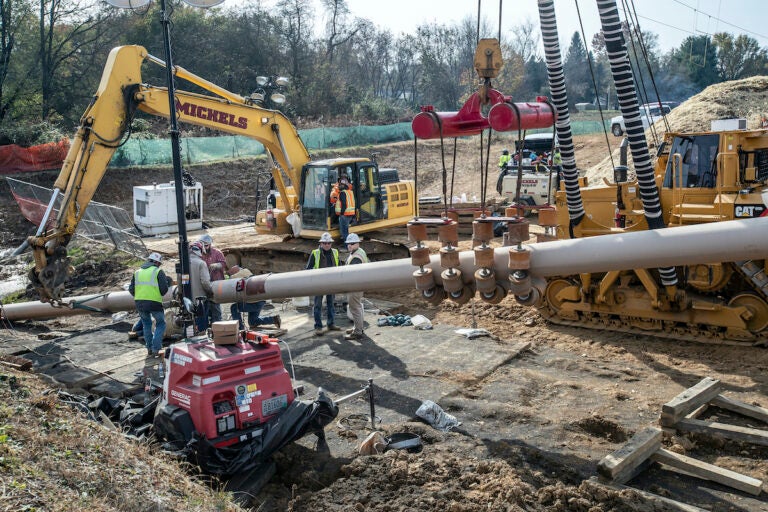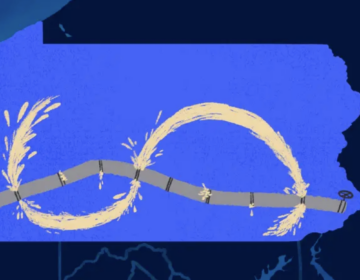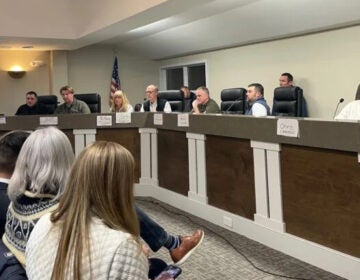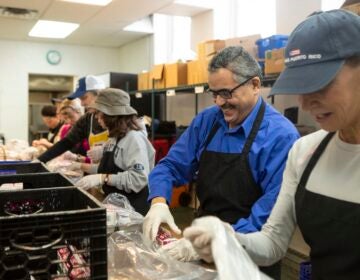Info about Mariner East-related water testing not public
The Pa. AG had reached a plea deal with Energy Transfer that included free water testing for residents who might have been affected by Mariner East II pipeline construction.

Pipefitters work to connect a long segment of pipe that is being suspended in air to make it ready to be pulled underground in a residential area of West Chester, Pennsylvania, in November 2019. (Michael Bryant / Philadelphia Inquirer)
This story originally appeared on Spotlight PA.
As part of its 2022 plea deal with the Pennsylvania Office of Attorney General, natural gas company Energy Transfer agreed to fund the testing and remediation of residential water supplies polluted by the construction of its Mariner East II pipeline.
But in the nearly two years since that agreement was announced, little information has been released to the public by the state or company about how many households have had their water tested, how many had their water treated if it was contaminated, and the overall status of the testing process, which is run by the state attorney general’s office.
At the time, the deal was touted by the agency, then led by Josh Shapiro, as a way to hold Energy Transfer and Sunoco accountable for leaking thousands of gallons of drilling fluid into groundwater, lakes, and streams from 2017 to 2021, and address residents’ concerns about whether their water was safe.
“Today we’re upholding our oath to our constitution and holding Energy Transfer accountable for their crimes against our natural resources,” Shapiro said in a news release at the time.
The conviction, in which Energy Transfer pleaded no contest to 14 environmental crimes, found that the company’s subsidiary Sunoco polluted waterways and “failed to report the losses of fluid to the Pennsylvania Department of Environmental Protection (DEP) numerous times, in spite of the legal requirement to do so,” according to a news release.
Energy Transfer did not respond to a request for comment.
As part of the deal, affected residents were offered free water testing funded by the company. In June, ahead of the August 2022 announcement, the Office of Attorney General sent out letters detailing the testing program to people living within 450 feet of the right of way of the pipeline. Residents who received a letter were told about the criminal case and asked to indicate whether they wanted their water to be independently evaluated, free of charge, by a professional and independent geologist.
The Office of Attorney General did not establish a way to publicly track who was contacted and how many people signed up. The office has said this information cannot be disclosed because it relates to a criminal investigation, which makes the records exempt under Pennsylvania’s Right-to-Know Law.
Some residents who asked for testing say the process to receive it has been long and arduous, and have expressed confusion over the terminology used by the attorney general’s office, which in documents reviewed by Spotlight PA called the testing requests “complaints.”
“This process is a mammoth undertaking involving multiple agencies and coordination with homeowners, so it will naturally take time,” Brett Hambright, a spokesperson for the attorney general’s office, wrote in an email to Spotlight PA. “The Office of Attorney General has received one complaint from a homeowner frustrated with the process. Additionally, we have received a few timing inquiries and we provided those homeowners with a status update on their individual investigation. Most were happy to have that information.”
Testing information not public
The number of tests done so far, the results of those tests, and how many residents have been provided water supplies by Sunoco have not been publicly disclosed by either the attorney general’s office or the Department of Environmental Protection.
Spotlight PA submitted open records requests to both agencies, but was told that either the information was exempted as part of the Office of Attorney General’s criminal investigation or the records didn’t exist.
A spokesperson for the attorney general’s office said it received “just under 800 requests” for tests by Aug. 19, 2022, the deadline set by the agency. However, there isn’t a way for the public to track how many of those requests were granted or how many resulted in an independent geologist evaluation.
Hambright told Spotlight PA that professional geologists hired by the state are tracking this data. “We hired professionals to handle this task and the data is with them, not with the Office of Attorney General,” he said.
Because of the investigation exemption, it’s also unclear how many households received a letter about the free water evaluations.
Joint permit applications — documents in which companies explain the scope and possible impacts of a project to state regulators — offer a partial picture. Applications that Sunoco submitted to the DEP prior to construction show that at least 2,800 addresses in 17 counties the pipeline passes through either had properties that adjoined the pipeline or were listed in the Mariner East II project area.
In October, student journalists from the News Lab at Penn State spoke to residents in 30 households in Blair County whose properties adjoin or are near the pipeline. Members of eight of those households recalled receiving the initial letter about water testing from the attorney general’s office.
A spokesperson for the agency said a public advisory campaign was conducted to inform people “in proximity of the pipeline” (residents outside of the 450-feet boundary), who could also request a free water evaluation during a two-week period in August 2022.
Blair County resident Chris Messner, who says his well is within 100 feet of the pipeline, told Spotlight PA he received a letter and that he asked for a water test. But he didn’t hear from one of the geologists until April 2023. By that time, he didn’t see the point in pursuing his complaint further.
“I have a very busy life,” Messner said. “I don’t have time for this, or the energy.”
Messner told Spotlight PA that Sunoco had tested his water throughout the construction process, beginning in 2017, which he said “increased turbulence.” In other words, the pipeline created more sediment in his well.
He had been concerned about how drilling was going to impact his well water, so he talked to his township and the Blair County Conservation District.
“Nobody from the local government wanted anything to do with me. They were just [like], ‘That’s not our department. We have nothing to do with that.’ … Then to get a letter from the state, however many years later … it’s like a big joke.”
A complicated process
The Office of Attorney General said testing would be widely available, but the process was cumbersome.
First, residents were supposed to have responded to the “Notification Letter,” sent in the summer of 2022, with a request to have their water tested. Then, a geologist hired by the state would conduct an initial review to determine whether testing was necessary. If a test was needed, the geologists would proceed, and then homeowners and Sunoco would both be able to appeal the results.
When Ralph Duquette, who lives in Lebanon County, requested a test, he said he started to receive mail asking why he filed a “complaint.” Duquette was surprised to learn that his response to the initial letter and request for testing was considered a complaint.
He said he got the impression that the notification letter was only asking if he wanted his wells tested.
“So I responded, ‘Sure, why not?’ It was going to be free,” Duquette said.
Spotlight PA spoke to an Office of Attorney General official familiar with the agreement. They said the tests were included in the plea deal as an alternative to the DEP’s way of handling water complaints, which, if appealed, can go to the agency’s Environmental Hearing Board. But residents whose initial reviews determined they didn’t need a test would need to file a complaint to the DEP anyway, the official said.
“Our program is in addition to what is typically available to someone in Pa. who has concerns about their water after the installation of a pipeline,” Hambright told Spotlight PA. “This program gave homeowners a separate avenue for analysis.”
Duquette said that since his initial response, he has received additional letters saying his complaint was not substantiated and that a test wasn’t necessary.
“I think if they offer, just my personal opinion, if they offer to test your well … that if you answer in the affirmative, they just test your water.”
Other hurdles
Another obstacle in the process was that private wells are not tracked by the government in Pennsylvania.
The government used data that Sunoco itself collected prior to beginning construction on the pipeline in 2017. There were some cases, according to the official familiar with the agreement, in which Sunoco had failed to contact households with wells within 450 feet of the pipeline, so the geologists hired by the agency had to establish which houses actually met that threshold.
Sunoco was able to construct the pipeline without necessarily getting permission from homeowners due to what environmental lawyer Rich Raiders called a “gap” in the pipeline regulatory system.
He was referring to a Commonwealth Court ruling that found that because the pipeline was “intrastate” — even though it passes through Ohio and West Virginia first — the pipeline fell under the purview of Pennsylvania’s Public Utility Commission. As a result, the pipeline counted as a public service under state law because it had service points within Pennsylvania, and Sunoco didn’t need residents’ OK to build on their properties.
Another issue posed by the design of the testing program, Raiders said, is that even if a resident’s water appears normal at the time of the test, geology is not static. In other words, Sunoco’s equipment moved substantial amounts of earth and rock beneath people’s wells and consequences of the activity are ongoing, so future issues could arise.
Ultimately, the process has left some residents disillusioned and discouraged.
“You know how you pay taxes every year? It’s such a pain in the ass, but you got to do it. … This is what this whole process felt like, as far as the state and getting water tested. It’s just a big freaking hassle that I don’t have time for,” Messner said.
He added: “If it was a little more straightforward and a little easier to set up … I would have really been more motivated to follow through with it.”
News Lab at Penn State student journalists Abby Chachoute, Julia Mertes, Nick Stonesifer, Milan Varia, and McKenna Wall contributed reporting from Blair County.
Lilly Riddle is an intern with Spotlight PA’s State College regional bureau.

Get daily updates from WHYY News!
WHYY is your source for fact-based, in-depth journalism and information. As a nonprofit organization, we rely on financial support from readers like you. Please give today.





